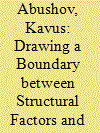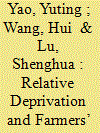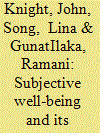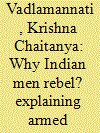|
|
|
Sort Order |
|
|
|
Items / Page
|
|
|
|
|
|
|
| Srl | Item |
| 1 |
ID:
086588


|
|
|
|
|
| Publication |
2009.
|
| Summary/Abstract |
What are the health effects of unequal economic growth? What are the health consequences of 'keeping up with the Jones'? Many developed countries (e.g., US and Japan) have experienced significant income growth between 1950s and 2000s but population survey shows that on average the population is not growing more satisfied with life. Theories that attempt to respond to these findings hypothesize that as income grows, people may spend more on conspicuous consumption because they compare themselves with others in their peer groups and care about their position in socio-economic distributions relative to others. Indeed, public health studies have found a relationship between income inequality and adult health outcomes in developed countries. Specifically, there seems to be a correlation between social hierarchy and mortality, as well as a correlation between social hierarchy and morbidity.
China is a prime study site due to its growing spatial inequalities in the past decade. Though China has been committed to economic reform, different regions and cities have encountered very disparate rates of development and growth. In this paper, we utilize a set of panel data collected in China (China Health and Nutrition Survey 1989-2004) to examine the effects of peer groups, relative deprivation, and income disparities on individual health outcomes such as the probability of high waist circumference, body mass index categories, probability of hypertension, nutritional intake as well as health behavior such as smoking. We use a combination of multi-level mixed effects modeling as well as factor analysis to examine these effects and find significant and differential effects of income quartiles, peer groups, relative deprivation, and Gini coefficient on health.
|
|
|
|
|
|
|
|
|
|
|
|
|
|
|
|
| 2 |
ID:
188043


|
|
|
|
|
| Summary/Abstract |
This article focuses on the causes of ethnic civil wars, and argues that in order to develop a better understanding of their onset and intractability, one needs to distinguish different types of ethnic civil wars from each other. It first evaluates structural factors in the outbreak of ethnic conflict and then proceeds to discuss ideational factors and finally suggests a theoretic framework of understanding ethnic conflict based upon identity. It develops hypotheses that would allow to discern structuralist explanations from ideational ones and in this way contributes to the literature that tries to understand the causes of ethnic civil wars. To have a clear understanding of the suggested hypotheses, empirical evidence is provided from the post-Soviet space, namely conflicts such as Abkhazia, Crimea, Chechnya, Nagorno-Karabakh, and South Ossetia.
|
|
|
|
|
|
|
|
|
|
|
|
|
|
|
|
| 3 |
ID:
182668


|
|
|
|
|
| Summary/Abstract |
This article posits that free-market institutions and practices reduce economic distortions that provide rents for underground organizations, which ultimately form criminogenic environments. Rents from market distortions provide ‘lootable income’ that feeds ‘criminal organizations’, which rely on violence for enforcement of contracts. Using an index of economic freedom, this study contrasts several relevant measures of political freedoms, political discrimination of individuals and groups, and measures of equal access to state ‘goods’ as proxies for political legitimacy and discrimination on the homicide rate. Fixed effects regression results suggest robustly that economic freedom, not political legitimacy, inclusive politics, or state capacity, reduces the homicide rate, results that are stubbornly significant and substantively large. The basic results are robust to a barrage of model specifications, different sample sizes, and estimation strategies, including instrumental variables analysis. The evidence suggests that unusually high homicide rates might be based in quotidian organizational activities related to ‘illegal’ markets rather than to political grievance-based explanations relating to relative deprivation and political legitimacy. Countries wishing to encourage growth-promoting policies need not fear higher levels of interpersonal violence based on various arguments linking free-market policies to societal disarray.
|
|
|
|
|
|
|
|
|
|
|
|
|
|
|
|
| 4 |
ID:
114673


|
|
|
|
|
| Publication |
2012.
|
| Summary/Abstract |
This article examines developments in the analysis of communal conflict over the past twenty years, exploring insights regarding the relationships of economic structure, conceptions of deprivation, and the constructions of narratives making sense of civil strife. The piece compares analyses from differing paradigms and disciplines, including terrorism studies, the sociology of violence and war, and the anthropology of violence. The article explores how shifting emphases from both participants and analysts cast incidents of violence in a different light, proscribing differing potential intervention strategies and interpretations of outcomes. Highlighting these shifts provides new space for analyses and greater understanding of the potential costs and consequences of intervention.
|
|
|
|
|
|
|
|
|
|
|
|
|
|
|
|
| 5 |
ID:
077130


|
|
|
|
|
| Publication |
2007.
|
| Summary/Abstract |
Terrorist groups have yet to attract the same level of academic interest as other social movement organizations (SMOs), although they are well suited to the analytical approach pioneered by Ted Gurr, Doug McAdam, Sidney Tarrow, and Charles Tilly. Social constructivism offers a valuable frame with which to assess state responses to terrorism. Carlos Marighela argued that one of the principal goals of the urban guerrilla was to goad the state into a spasm of overreaction that would undermine its legitimacy in the eyes of the public. This article takes Marighela's concept one step further, arguing that by adopting repressive counterterrorism policies, democratic states "socially construct" more resilient, more aggressive terrorist organizations. Like Hercules' antagonist Antaeas in Greek mythology, terrorist groups draw their strength from their surrounding environment. Successful counterterrorism strategies erode popular support for terrorism and unsuccessful ones contribute to it. This paper examines the experiences of five democratic states - the United Kingdom, Germany, Canada, Italy, and Israel - from this perspective and concludes that when confronting terrorism, the greatest challenge of all is to adopt and maintain a measured response to terrorist outrages
|
|
|
|
|
|
|
|
|
|
|
|
|
|
|
|
| 6 |
ID:
152719


|
|
|
|
|
| Summary/Abstract |
How do sanctions affect the dynamics of political violence in target states? More specifically, how might sanctions affect domestic terrorism in these states? The literature on the consequences of sanctions in target states is rich, yet there has been limited research on how sanctions affect terrorism in target states. In this article, I argue that economic deprivation associated with costly sanctions makes recruiting and carrying out attacks easier for domestic terrorist organizations. Building on work that examines the consequences of sanctions and the economic roots of terrorism, I suggest that sanctions impose economic hardship on regular citizens, who are then more likely to turn to anti-government violence. The result is that the pool from which terrorist groups recruit is broadened during sanctions. I test this argument quantitatively and find support for the hypothesis that costly sanctions lead to higher levels of domestic terrorism.
|
|
|
|
|
|
|
|
|
|
|
|
|
|
|
|
| 7 |
ID:
186815


|
|
|
|
|
| Summary/Abstract |
Despite extensive scholarly interest in the association between economic inequality and political violence, the micro-level mechanisms through which the former influences the latter are not well understood. Drawing on pioneering theories of political violence, social psychological research on relative deprivation, and prospect theory from behavioral economics, we examine individual-level processes that underpin the relationship between inequality and political violence. We present two arguments: despite being a key explanatory variable in existing research, perceived lower economic status vis-à-vis other individuals (an indicator of relative deprivation) is unlikely to motivate people to participate in violence; by contrast, although virtually unexplored, a projected decrease in one’s own economic status (prospective decremental deprivation) is likely to motivate violence. Multilevel analyses of probability samples from many African countries provide evidence to support these claims. Based on this, we posit that focusing on changes in living conditions, rather than the status quo, is key for understanding political violence.
|
|
|
|
|
|
|
|
|
|
|
|
|
|
|
|
| 8 |
ID:
181880


|
|
|
|
|
| Summary/Abstract |
Land expropriation is a common source of grievances and resistance from farmers in China. Based on survey data, we propose that farmers’ sense of relative deprivation is one of the causes. Our study focuses on compensation distribution in villages, where village collectives are the reference for comparison. Relative deprivation is measured by the ratio of farmer compensation to the standard government compensation; the gap between these is roughly the compensation retained by village collectives. The outcome variable is farmers’ willingness to participate in village governance. The empirical test is based on 2017 data from the Chinese Family Database of Zhejiang University and compensation standards data collected by the authors. Nearly 75% of respondents received less than standard compensation, which indicates widespread relative deprivation. And the greater the relative deprivation of farmers, the more willing they are to participate in village governance.
|
|
|
|
|
|
|
|
|
|
|
|
|
|
|
|
| 9 |
ID:
092530


|
|
|
|
|
| Publication |
2009.
|
| Summary/Abstract |
A national household survey for 2002, containing a specially designed module on subjective well-being, is used to estimate pioneering happiness functions in rural China. The variables that are predicted by economic theory to be important for happiness prove to be relatively unimportant. Our analysis suggests that we need to draw on psychology and sociology if we are to understand. Rural China is not a hotbed of dissatisfaction with life, possibly because most people are found to confine their reference groups to the village. Relative income within the village and relative income over time, both in the past and expected in the future, are shown to be important for current happiness, whereas current income is less so. Even amidst the poverty of rural China, attitudes, social comparisons and aspirations influence subjective well-being. The implications of the findings for the future and for policy are considered.
|
|
|
|
|
|
|
|
|
|
|
|
|
|
|
|
| 10 |
ID:
186943


|
|
|
|
|
| Summary/Abstract |
Land expropriation, where peasants’ property rights are encroached by the state, has been recognized as a primary source of social dissension in rural China. Since the end of the last century, the Administrative Litigation Law (ALL) has provided people with a legal weapon to defend themselves against violations by state power. Drawing on the theory of relative deprivation, this paper proposes that peasants are more likely to sue the state when they feel deprived. To examine this hypothesis, we first present a case study to depict the causal process and then use quantitative research to improve the external validity of our findings. We created a novel and unique database of prefecture-level administrative litigations and relative deprivation for Poisson regression analysis. The quantitative results prove that the more peasants feel relatively deprived, the more likely they are to sue the state. Furthermore, the positive effect of relative deprivation on administrative litigations has become more significant over time, implying peasants’ growing awareness of legal resistance. This paper concludes that a critical step towards eliminating social inequity and maintaining social stability in rural China is to reduce the relative deprivation of peasants by, for example, allowing them to share in land value appreciation in the process of urbanization.
|
|
|
|
|
|
|
|
|
|
|
|
|
|
|
|
| 11 |
ID:
107655


|
|
|
|
|
| Publication |
2011.
|
| Summary/Abstract |
Armed conflicts have been a permanent feature of the northeastern region since Indian independence. Surprisingly, relentless conflicts in this remote region of India have received little attention in the literature. Although some studies on conflicts in India have made important contributions to understanding and analyzing the causes of conflicts in general, none of them has paid specific attention to the ongoing conflicts in the northeastern region of India. Relative deprivation and persistent economic and political discrimination are often identified as the major causes for armed rebellion in this region. I provide a first quantitative test of this argument, exploring whether deprivation and continual economic and political discrimination explain the probability of armed conflict incidence across nine northeastern states of India during the period 1970-2007. The main findings from probit estimations show that poverty (relative to the rest of the country) and economic and political discrimination explain conflict outbreaks, after controlling for income, population pressures, state capacity, ethnic affiliations, forest area, peace years, neighboring conflict incidence, and distance to New Delhi. The study also reports considerable support for the baseline results when controlling for potential reverse feedback effects using the generalized method of moments. These results are robust to alternative estimation techniques and sample size.
|
|
|
|
|
|
|
|
|
|
|
|
|
|
|
|
|
|
|
|
|